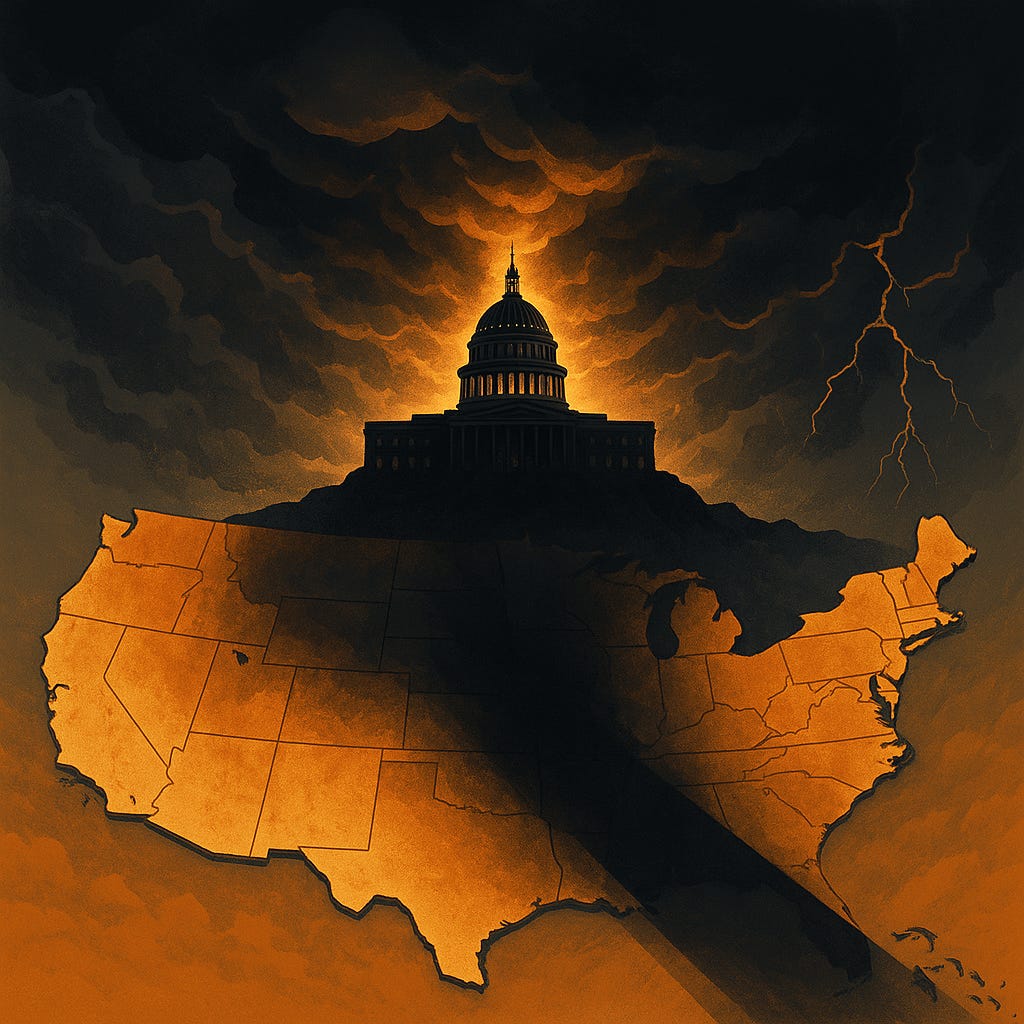The Argument in 1787
In Federalist No. 14, James Madison comes out swinging against a line of attack from the Anti-Federalists: that the United States is simply too big for a republic to govern. His critics argued that a government stretched across such a large territory would be slow, unresponsive, and destined to collapse. Madison counters by making a crucial distinction. The proposed Constitution does not create one giant, centralized government controlling every village and hamlet. Instead, it builds a federal republic where local and state governments handle most affairs, and the national government takes on a limited set of responsibilities that bind the states together.
Madison’s punch line is that distance does not doom self-government. He notes that people could travel from one end of the country to the other in less than two weeks on horseback, so communication and administration were hardly impossible. He reminds readers that roads, rivers, and human ingenuity keep shrinking the distance. His vision is one of connection: the Union as a bridge linking communities, not a wall separating them.
Key Quote
"Is it not the glory of the people of America, that, whilst they have paid a decent regard to the opinions of former times and other nations, they have not suffered a blind veneration for antiquity, for custom, or for names, to overrule the suggestions of their own good sense, the knowledge of their own situation, and the lessons of their own experience?"
This is Madison at his sharpest. He is basically saying, “Do not let fear of the new keep you from building something better.”
The Modern Parallel: Too Big to Govern?
The same argument pops up today, just dressed differently. Instead of horses and rivers, we talk about the internet, supply chains, and social media. Skeptics say America is too large, too diverse, and too fractured to be governed as a single republic. Polarization fuels the sense that California and Texas, or Vermont and Florida, are living in separate nations. Calls for “national divorce” or carving the country into red and blue republics echo the Anti-Federalist warnings of 1787.
But Madison’s response still holds. The United States works when the federal government sticks to its limited, shared responsibilities such as defense, interstate commerce, and foreign policy, and leaves room for states and communities to govern the rest. Problems come when Washington tries to manage every detail of daily life, or when states refuse to recognize the obligations that bind them to each other. The system breaks when balance collapses. What was once Ronald Reagan’s “Shining City on the Hill” has become a perverted Mordor casting darkness on the rest of us.
And collapse is exactly what federal overreach invites. Over the last century, Washington has treated the Tenth Amendment as more of a suggestion than a rule. The amendment makes clear that powers not delegated to the federal government are reserved for the states or the people. Yet modern Washington grabs for more and more. Education, healthcare, housing, energy policy, even what should be local zoning and land use decisions, now fall under the reach of federal mandates, grants, or regulations. The irony is that the Anti-Federalists feared the national government would never stay limited, and today they would have the evidence to prove their point.
Executive power adds fuel to the fire. Both parties have relied on executive orders to bypass Congress and impose sweeping national policies. What was meant to be a tool for implementing laws has become a substitute for legislation. Presidents of both parties wave a pen and declare new rules on everything from immigration to climate to student loans. Instead of the deliberation Madison designed, we get government by press release. And it is only getting worse. Each president seems eager to go a little further than the last, issuing edicts from the throne as if Congress and the Constitution were merely formalities.
This trend undermines not only federalism but also trust. When Washington expands its reach into every corner of American life, citizens stop seeing the federal government as an arbiter of common interests and start viewing it as a meddler in their local affairs. That loss of trust is more corrosive than geography ever was. Madison argued that scale was not the enemy of republican government. But when Washington insists on treating every problem as its own to solve, it becomes the very thing the Anti-Federalists warned against: a distant, centralized authority that suffocates liberty rather than secures it.
Technology Shrinks Distance But Also Warps It
Madison’s argument about horses and rivers might sound quaint, but it foreshadows the role of technology in binding a big republic. Today, planes and fiber-optic cables make communication instantaneous. The difference is that information overload changes the quality of governance. A rumor in one corner of the country does not take two weeks to travel anymore; it takes two minutes to go viral.
The speed of connection accelerates division. Twitter, or X, or whatever Elon calls it this month, turns every local fight into a national spectacle. A school board meeting in rural Virginia can set off a week-long firestorm on cable news. Algorithms feed outrage to keep eyeballs glued, and that outrage makes it feel like the republic is on the verge of collapse every single day. The same technology that shrinks distance also magnifies conflict.
Madison’s optimism about roads and rivers must now be paired with a healthy suspicion of how tech platforms distort civic life. If roads built unity, algorithms build division. The challenge for our generation is whether we can modernize Madison’s insight and use technology to bind rather than break. We should be skeptical right now, but we each have a duty to improve the problem, not lament it.
A Free Market Take
From an economic standpoint, Madison’s vision is pro-commerce. A large republic creates scale, efficiency, and shared prosperity. Free exchange across states is only possible when the Union ensures stability. When Anti-Federalists argued that states should stand alone, they were also arguing for a fractured economic system with tariffs, competing currencies, and constant disputes. Think of it as thirteen competing Amazons, each charging you extra shipping for crossing state lines.
Madison’s case for unity is also a case for open markets. A national framework lowers barriers to trade and builds prosperity by allowing people, goods, and capital to flow. Modern free-market thinkers at places like Cato and Mercatus often make the same point: national unity and limited government are not enemies but necessary partners. Markets thrive on stability, enforceable contracts, and predictable rules. A fractured union would undermine all three.
And here is the kicker: the fights we see today about tariffs, interstate energy policy, or regulatory sprawl are Madison’s argument all over again. The more Washington dictates in detail, the more it risks strangling the benefits of scale. The more states retreat into protectionism, the more they erode the free flow Madison saw as essential.
We see this tension in real time with the federal government taking an equity stake in Intel as part of a subsidy arrangement. On the surface, it looks like a bold industrial policy designed to strengthen domestic chip manufacturing. But in practice, it looks far more like Soviet-style command and control. The federal government is now not only regulating industry, but owning a piece of it. That is not Madison’s republic. That is the state picking winners and losers, distorting markets, and substituting political priorities for consumer choice.
What makes this more telling is that even the normally docile advocates of free markets spoke up in protest. For a moment, think tank scholars and libertarian economists found their voice. Yet if history is any guide, the outrage will fade quickly. The press releases and op-eds will give way to a weary acceptance, and the same free-market voices will go quiet again. That silence is as dangerous as the policy itself, because it normalizes government as shareholder and leaves the field wide open for the next command-and-control experiment.

Madison wanted a republic that created the conditions for prosperity, not one that managed industry from Washington like a politburo. The Intel episode is a reminder that the greatest threat to free markets is not only government overreach, but the willingness of those who know better to fall silent after the first wave of criticism passes.
Modern Politics: National Divorce or National Renewal?
If Madison were alive today, he would scroll through cable news and wonder if the Anti-Federalists had finally gotten their wish. Talk of a “national divorce” is not just a Twitter stunt. It is language coming from sitting governors, members of Congress, and well-funded political groups. The idea that America is too divided to stay united is making a comeback.
But Madison already answered this in 1787. He warned that breaking the Union into smaller republics would not solve conflict; it would multiply it. Instead of clashing within a single framework with shared rules, states would become rivals with competing trade laws, military alliances, and foreign entanglements. Look at the European Union today: a voluntary federation of nations constantly wrestling with whether to hold together or split apart. Madison’s vision was stronger than that. He wanted a binding republic, not just a cooperative agreement.
Modern politics also shows how the federal principle still works when we let it. States experiment with policies on energy, education, and healthcare, while the national government covers defense, trade, and civil rights. The mess comes when Washington insists on one-size-fits-all solutions, or when states treat federal law as optional. The tension is old, but the stakes are new. From abortion laws to climate policy to border enforcement, the fight over federalism is Madison’s debate playing out in real time.
The lesson from Federalist 14 is that the Union does not collapse because of differences. It collapses when we decide difference is irreconcilable. That is a political choice, not a geographic inevitability.
Where It Falls Short
Madison, ever the optimist, underestimated how cultural distance could be harder to bridge than physical distance. He thought geography was the biggest obstacle to republican government, not ideology. Today, the problem is not that Washington is too far away in miles, but that it feels too far away in spirit. When half the country thinks the system is rigged against them, physical closeness will not heal the breach. Federalist 14 gives us the architecture, but not the trust required to keep it standing.
The Last Word
Federalist 14 is Madison at his most forward-looking. He urges Americans to think beyond what has been tried before, to trust in innovation, and to see the republic as a living bridge across distance and difference. His words still resonate when cynics say America is ungovernable. The answer is not to shrink from scale but to balance power smartly, to let local communities thrive, and to keep the national government focused on its core tasks.
Or as Madison might put it if he were tweeting today:
The Union is not too big to govern. It is too important to abandon.






This is a great essay. I may have mentioned this before but Brink Lindsey has a book coming out in Jan 2026 entitled “The Permanent Problem: The Uncertain Transition from Mass Plenty to Mass Flourishing.” We need to go back in time and renew our appreciation for the complex systems we have built (including federalism) but at the same time trigger a rebirth of skills and energy to build even more complex systems where people can meet their basic needs but also find meaning, purpose and fulfillment. It would be great fun to talk with Madison if he were alive today!
Very interesting piece, thank you.